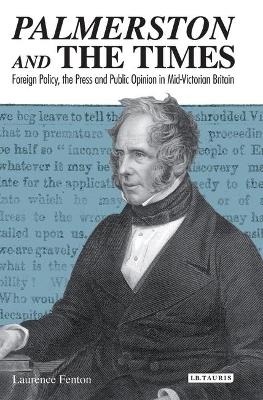
Palmerston and the Times
Foreign Policy, the Press and Public Opinion in Mid-Victorian Britain
Seiten
2012
I.B. Tauris (Verlag)
978-1-78076-074-2 (ISBN)
I.B. Tauris (Verlag)
978-1-78076-074-2 (ISBN)
Victorian Britain had two players of colossal influence on the world stage: Lord Palmerston - the dominant figure in foreign affairs in the mid-nineteenth century - and "The Times" - the first global newspaper, read avidly by statesmen around the world. This book explores the highly-charged rivalry between these two titans of the era.
England in the Age of Palmerston had two players of colossal influence on the world stage: Lord Palmerston himself - the dominant figure in foreign affairs in the mid-nineteenth century - and The Times - the first global newspaper, read avidly by statesmen around the world. Palmerston was also one of the first real media-manipulating politicians of the modern age, forging close links with a number of publications to create the so-called 'Palmerston press'. His relationship with The Times was more turbulent, a prolonged and bitter rivalry preceding eventual rapprochement during the Crimean War. In this book, Laurence Fenton explores the highly charged rivalry between these two titans of the mid-Victorian era, revealing the personal and political differences at the heart of an antagonism that stretched over the course of three decades. Fenton focuses on the years from 1830 to 1865, when Palmerston was British Foreign Secretary and Prime Minister for a combined total of almost twenty-five years, and when The Times, under the editorship of first Thomas Barnes and then John Delane, reached the zenith of its success.
It was a period during which public interest in foreign affairs grew immeasurably, encompassing the tumultuous 'Year of Revolutions', the famous 'Don Pacifico' debate and the Crimean War. Palmerston and The Times adds significantly to the understanding of the life and career of Lord Palmerston, in particular the relationship he enjoyed with the press and public opinion that was so vital to his incredibly long and multifaceted political career. It also brings to light the remarkable men behind the success of The Times, paying fair tribute to their abilities while at the same time warning against the long-standing view of The Times as a paragon of newspaper independence in this era. It will be essential reading for researchers of Victorian history and for anyone interested in the tumultuous relationship between politics and the press.
England in the Age of Palmerston had two players of colossal influence on the world stage: Lord Palmerston himself - the dominant figure in foreign affairs in the mid-nineteenth century - and The Times - the first global newspaper, read avidly by statesmen around the world. Palmerston was also one of the first real media-manipulating politicians of the modern age, forging close links with a number of publications to create the so-called 'Palmerston press'. His relationship with The Times was more turbulent, a prolonged and bitter rivalry preceding eventual rapprochement during the Crimean War. In this book, Laurence Fenton explores the highly charged rivalry between these two titans of the mid-Victorian era, revealing the personal and political differences at the heart of an antagonism that stretched over the course of three decades. Fenton focuses on the years from 1830 to 1865, when Palmerston was British Foreign Secretary and Prime Minister for a combined total of almost twenty-five years, and when The Times, under the editorship of first Thomas Barnes and then John Delane, reached the zenith of its success.
It was a period during which public interest in foreign affairs grew immeasurably, encompassing the tumultuous 'Year of Revolutions', the famous 'Don Pacifico' debate and the Crimean War. Palmerston and The Times adds significantly to the understanding of the life and career of Lord Palmerston, in particular the relationship he enjoyed with the press and public opinion that was so vital to his incredibly long and multifaceted political career. It also brings to light the remarkable men behind the success of The Times, paying fair tribute to their abilities while at the same time warning against the long-standing view of The Times as a paragon of newspaper independence in this era. It will be essential reading for researchers of Victorian history and for anyone interested in the tumultuous relationship between politics and the press.
Laurence Fenton is a writer and editor living in Cork, Ireland. He is the author of The Young Ireland Rebellion and Limerick and has published articles in the Historical Journal and Media History. He holds a PhD from University College Cork and is currently researching nineteenth-century Irish-American history.
Prologue
1. Paths to Power
2. Origins of Animosity
3. A New Editor
4. ‘Champion of European Liberalism’
5. ‘The Austrian Organ’
6. The Rise and Fall of Palmerston
7. Rapprochement
8. The Last Years
Epilogue
| Erscheint lt. Verlag | 6.11.2012 |
|---|---|
| Sprache | englisch |
| Maße | 138 x 216 mm |
| Gewicht | 407 g |
| Themenwelt | Geschichte ► Allgemeine Geschichte ► Neuzeit (bis 1918) |
| Geisteswissenschaften ► Geschichte ► Regional- / Ländergeschichte | |
| Sozialwissenschaften ► Kommunikation / Medien ► Journalistik | |
| Sozialwissenschaften ► Politik / Verwaltung ► Europäische / Internationale Politik | |
| ISBN-10 | 1-78076-074-4 / 1780760744 |
| ISBN-13 | 978-1-78076-074-2 / 9781780760742 |
| Zustand | Neuware |
| Haben Sie eine Frage zum Produkt? |
Mehr entdecken
aus dem Bereich
aus dem Bereich
Europa 1848/49 und der Kampf für eine neue Welt
Buch | Hardcover (2023)
DVA (Verlag)
48,00 €
Giordano Bruno - ein ketzerisches Leben
Buch | Hardcover (2024)
C.H.Beck (Verlag)
29,90 €


